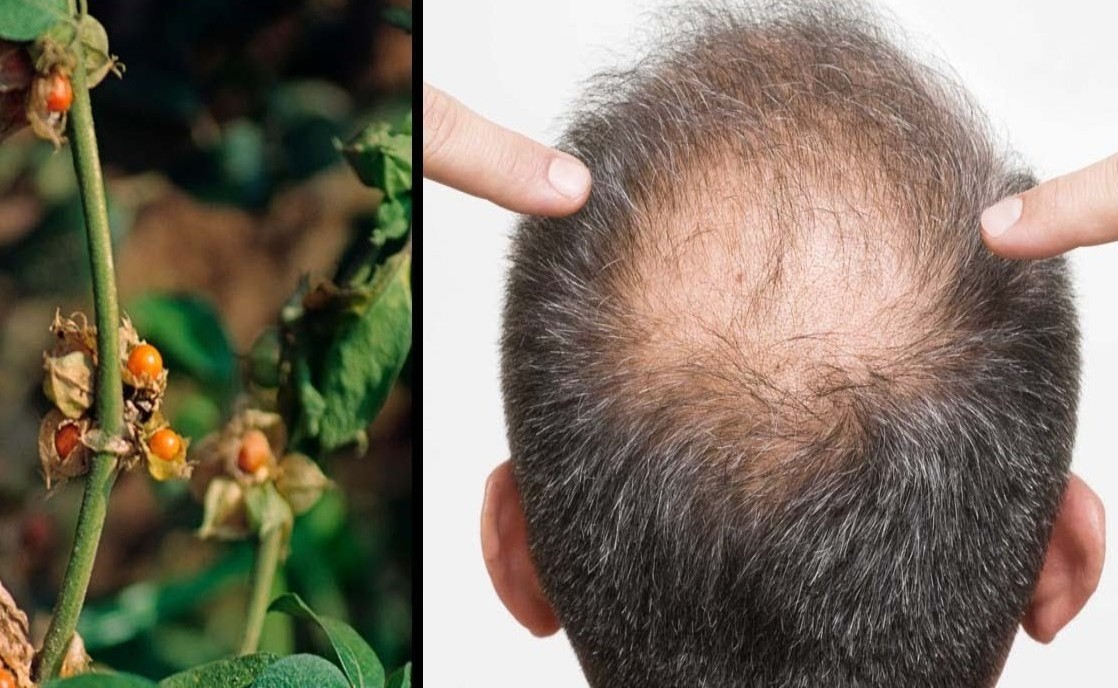Ashwagandha may help treat hair loss due to its effects on stress, inflammation, and hormone imbalances, but more research is needed to support these possible benefits.
Hair loss can be due to genetics, recent illness, and several other causes. It’s sometimes treatable with medications, lifestyle changes, or procedures, depending on the underlying cause.
Ashwagandha is one type of alternative treatment that some people use to self-treat hair loss. Known as an adaptogenic herb, it’s primarily used to support healthy sleep and mood. It’s thought that some of these same mechanisms could subsequently help with hair loss.
Learn more about the potential role of ashwagandha in hair loss treatment, including possible benefits and what current scientific research says about this remedy.
Is ashwagandha good for hair loss?
To date, there aren’t many clinical studies that have supported ashwagandha as a direct treatment for hair loss. However, some of its components, as well as its positive effects on stress, could possibly help to indirectly prevent hair loss.
Ashwagandha is a type of evergreen shrub indigenous to Africa, India, and the Middle East. It contains a group of bioactive substances called withanolides, which may haveTrusted Source antioxidant and anti-inflammatory effects.
The herb is also known as an adaptogen. This means that it can potentially increaseTrusted Source the body’s ability to fight environmental, biological, and physical stressors.
While ashwagandha might be promoted for a variety of uses, current researchTrusted Source supports it as a possible alternative treatment for anxiety, stress, and poor sleep quality. Additionally, some researchTrusted Source suggests the herb may help support male fertility by increasing testosterone levels.
Overall, a 2023 studyTrusted Source found that ashwagandha root extract was most likely to benefit hair loss in the following ways:
decreased stress levels reduced cortisol levels antioxidants that might promote healthy hair growth anti-inflammatory effects to stop further hair loss
Aside from cortisol, a 2022 reviewTrusted Source said that hormones have a significant impact on hair growth as well as thickness. The authors suggested that imbalances in androgens, estrogen, and other hormones could negatively interfere with hair growth cycles.
Additionally, a 2023 review noted the possible positive effects of ashwagandha in endocrine disorders like thyroid disease, which can also cause hair loss. However, the authors noted that excessive amounts of ashwagandha could cause side effects.
Ashwagandha for hair loss side effects and risks
Despite its wide use, ashwagandha does have some possible risks to consider when taken orally. These includeTrusted Source
liver injury drowsiness nausea vomiting diarrhea
Who should avoid using ashwagandha for hair loss?
Ashwagandha is not recommendedTrusted Source if you:
are pregnant have liver disease have an autoimmune disorder will have surgery in the near future have thyroid disease have hormone-sensitive prostate cancer
Also, you shouldn’t take ashwagandha if you take certain medications, due to possible interactions. These includeTrusted Source
thyroid medications immunosuppressants high blood pressure medications anti-seizure drugs diabetes medications sedatives
Speak with a doctor about the medications you take to see whether trying ashwagandha is safe for you.
How to use ashwagandha for hair loss
Ashwagandha is primarily available in supplement form, such as tablets or powders. It’s also available in topical products, such as liquid extracts. Depending on the product, these may be madeTrusted Source from the shrub’s leaf or root.
Speak with a medical professional before trying ashwagandha.
The exact dosage of oral ashwagandha may vary by product. While some people may take the supplement on a daily basis, it’s important to follow your doctor’s instructions for the exact dose and length of time you can safely take ashwagandha.
A 2022 review and meta-analysis suggest ashwagandha may be helpful when taken for stress at 300 to 600 milligramsTrusted Source per day. However, more studies are needed to confirm these findings.
Proven treatments for hair loss
There’s no single treatment treatment for hair loss that works for everyone and for all underlying causes. While ashwagandha and other alternative hair loss remedies are still being studied, the following medical treatments are commonly recommended by medical professionals:
Minoxidil (Rogaine): Available as either a topical or oral treatment, minoxidil helps address hair loss in its early stages by stimulating new hair growth and preventing further loss.Finasteride (Propecia): Finasteride is a once-daily oral medication prescribed to help treat male pattern hair loss.Spironolactone: Prescribed for female pattern hair loss , this oral medication may help stop hair shedding while also promoting thicker hair.Shampoos: There are over-the-counter hair loss shampoos containing a variety of hair growth-friendly ingredients, includingTrusted Source minoxidil and biotin.Laser therapy: A dermatologist may recommend laser therapy for hair loss if Rogaine or other medications haven’t worked.Microneedling: Microneedling uses hundreds of small needles on your scalp to help stimulate hair growth.Platelet-rich plasma (PRP): Sometimes combined with microneedling, PRP uses plasma from your own blood to create hair loss injections.Corticosteroid injections: If you’re diagnosed with alopecia areata , a doctor may recommend these injections to help stop hair follicle damage.Hair transplant: Considered a permanent solution, a hair transplant may treat spots of thinning hair or baldness.
Other complementary treatments for hair loss
If a blood test reveals deficiencies in biotin (vitamin B7), iron, or zinc, they may recommend you take a multivitamin to support hair growth.
A multivitamin may be preferable over taking large amounts of nutrients individually to prevent toxicity.
Where to get ashwagandha for hair loss
Ashwagandha is sold over the counter at pharmacies, natural health stores, and online vendors. It’s important to know that, like other types of supplements, ashwagandha is not approved by the FDATrusted Source . That means it’s not closely monitored by the government and may contain extra unlisted ingredients or ingredients in unsafe amounts.
Since ashwagandha is an herb and not a drug, this supplement is not typically covered by traditional medical insurance or government programs.
It’s possibleTrusted Source to receive partial coverage for alternative treatments, but only if they are prescribed by a medical doctor, and are known to safely help with the condition being treated.
For these reasons, ashwagandha is unlikely to be covered, though you may contact your insurance company to check if a medical practitioner does recommend the supplement as part of your hair loss treatment plan.
When to get medical help
It’s considered normal to lose 50 to 100 hairs per day, as your body is continually shedding old hair and growing new strands.
However, if you’re experiencing excessive hair shedding, you might consider seeing a dermatologist. Signs could include more hair loss than normal in the shower, on your comb, or on your pillow. You might also experience thinning hair, bald spots, or a receding hairline.
A dermatologist may identify the underlying cause and help offer treatment advice. Trying different medications and herbs without understanding the cause of your hair loss could make treatment ineffective.
The sooner a doctor diagnoses the cause of your hair loss, the more effective treatment and preventive measures can be.
Also, consider getting medical help if you’ve tried ashwagandha and have not seen any results, or if you’re experiencing potential side effects from this supplement.
Frequently asked questions about ashwagandha for hair loss
Before using ashwagandha as a potential hair loss treatment, consider discussing the following frequently asked questions with a medical professional:
Does ashwagandha increase or decrease DHT?
Ashwagandha may potentiallyTrusted Source decrease dihydrotestosterone (DHT). In males experiencing hair loss, blocking DHT may help promote healthy testosterone levels and subsequent hair growth.
Is ashwagandha available as a hair mask?
Ashwagandha is primarily available in oral supplemental form. You can, in theory, make a hair mask with a powder or liquid extract. However, applying ashwagandha topically may not address the underlying cause of hair loss, such as stress or hormonal imbalance.
How long does it take for ashwagandha to work for hair?
It’s not clear how long it takes for ashwagandha to work for hair regrowth, and there’s no set dosage for such purposes.
As a general rule of thumb, the National Center for Complementary and Integrative Health (NCCIH) says ashwagandha may be safe when taken for up to 3 monthsTrusted Source at a time.
Is ashwagandha good for your skin?
Findings from a 2023 studyTrusted Source suggest that topical ashwagandha may promote overall healthy skin and reduce the signs of photoaging, such as dryness, fine lines, and sunspots. Other research suggests ashwagandha may help treat skin ulcers, wounds, and overall inflammation.
Takeaway
Ashwagandha may potentially help promote healthy hair growth due to its effects on stress response, hormone balance, and inflammation. Still, more research is needed to determine how the herb may treat certain conditions that cause hair loss, and at what dosage.
Speak with a doctor before taking ashwagandha for hair loss. They can help determine the underlying causes of your hair loss and the safest and most effective treatment.



